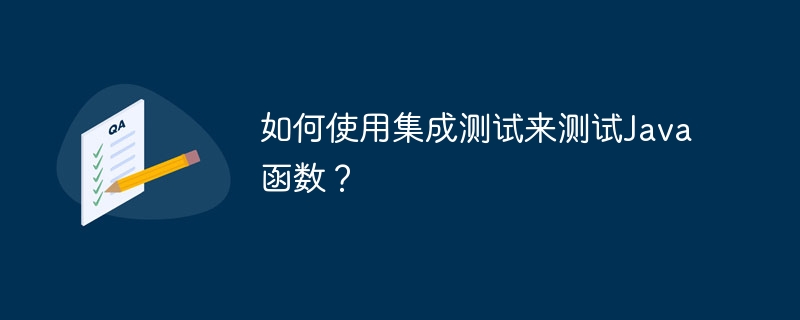Home >Java >javaTutorial >How to use integration tests to test Java functions?
How to use integration tests to test Java functions?
- WBOYWBOYWBOYWBOYWBOYWBOYWBOYWBOYWBOYWBOYWBOYWBOYWBOriginal
- 2024-04-27 09:21:011309browse
For Java functions, integration tests verify the expected behavior of the overall system. The steps include: 1) Create test cases; 2) Build the test framework; 3) Mock dependencies; 4) Execute the tests. In practical cases, integration testing of HTTP functions involves creating test cases, building test frameworks, simulating dependencies and executing tests, and verifying the results to ensure that the function can still work normally despite dependency issues.

Use integration tests to test Java functions
Integration testing is a type of software testing that is used to verify that the entire system or application works as expected. It is different from unit testing, which only focuses on a single function or module.
Integration testing of Java functions
To perform integration testing on Java functions, we need:
- Create test cases:Definition to be tested of different situations and scenarios.
- Build a test framework: Use a test framework such as JUnit to organize and run tests.
- Mock dependencies: Use libraries such as Mockito to simulate external services or components on which functions depend.
- Execute the test: Run the test case and evaluate the results.
Practical case: Test HTTP function
Suppose we have a Java function that handles HTTP requests and returns a response. We can use the following steps to integrate test it:
Create test cases:
@Test
public void testHttpGet() {
// 定义测试用例参数(例如,URL、请求体)
}Build test framework:
@RunWith(JUnit4.class)
public class HttpFunctionIT {
// 测试类
}Mock dependencies:
@Mock private HttpServletRequest request; @Mock private HttpServletResponse response;
Execute tests:
// 设置模拟依赖项 setUp(...); // 调用函数并验证结果 HttpFunction function = new HttpFunction(); function.service(request, response); // 断言响应状态码 assertEquals(HttpStatus.OK.value(), response.getStatus());
Conclusion
By using integration tests, we can improve Robustness and reliability of Java functions. By mocking dependencies, we are able to test functions without being affected by external factors. This helps ensure that the function works properly even if there are problems with its dependencies.
The above is the detailed content of How to use integration tests to test Java functions?. For more information, please follow other related articles on the PHP Chinese website!

